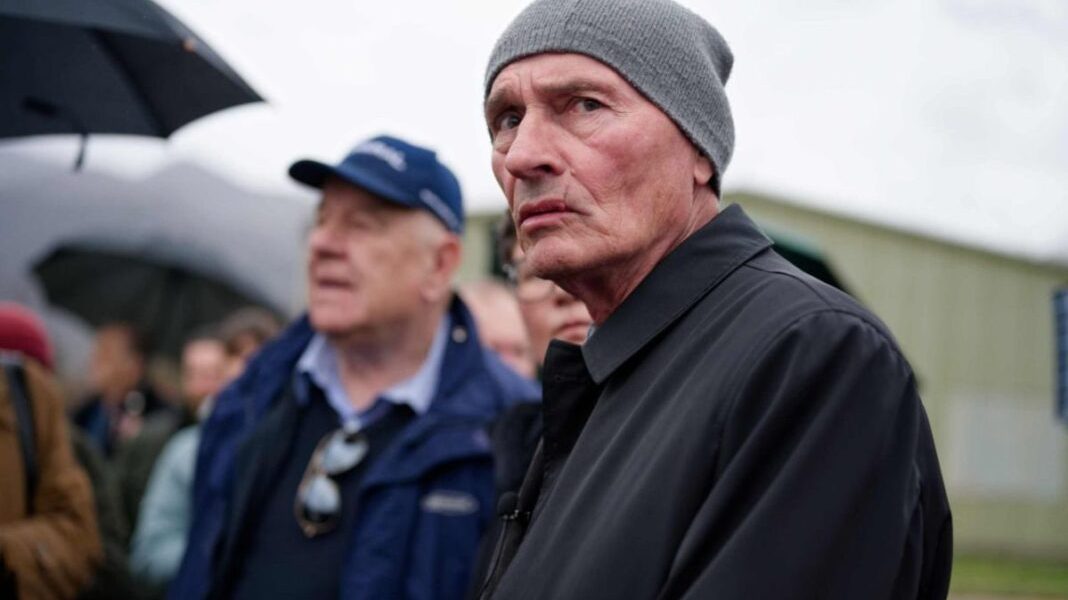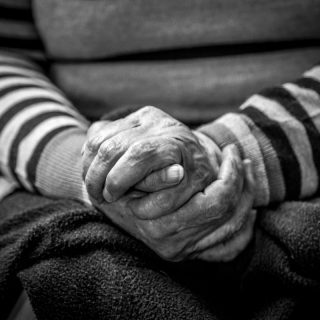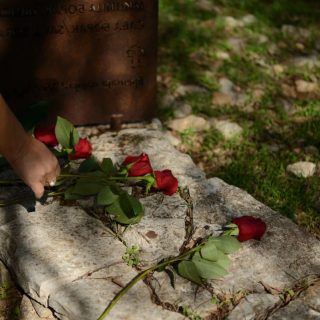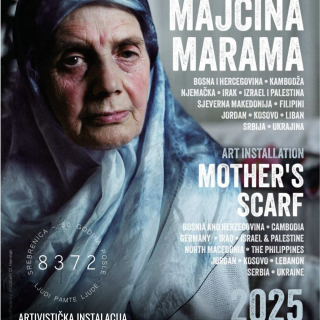More than thirty years have passed since Slobodan Mrkajić had been detained at concentration camps in Konjic, Hadžići and Igman. Today, he lives in Rogatica. He is the president of the Association of Concentration Camp Detainees of Sarajevo-Romanija Region and Association of Union of Concentration Camp Detainees of Republika Srpska.
Together with the Centre for Non-Violent Action, former concentration camp detainees, war veterans and peace activists from the region he visited these, but also numerous other concentration camps in Bosnia and Herzegovina. These were emotional and difficult visits, but of importance for the future, conveying the message that the past may not be forgotten and repeated.
Mrkajić: I visited almost all silos and concentration camps in Bosnia and Herzegovina together with the Centre and former detainees. The places of suffering of all peoples throughout the country. I threw a rose from a bridge in Doboj. They all are victims, innocent victims killed for no reason at all. From one, the other and third group. I cannot lie and say that I was not at a concentration camp, that there was no concentration camp. One has to tell the truth and not try to avoid it. That is reconciliation.
What was it like to go back to places in which you spent the most difficult moments of your life?
Mrkajić: I first visited Tarčin, where I was detained. Some people asked me why I do not go to Čelebići, since I spent more time there. All in good time. One first needs to make sure that one is able to go there without being thrown stones at, etc. Once the right conditions were there, I went there. It was difficult and emotional. People that went there with me know this well. They held me and comforted me. I was shaking and shuddering. I was losing my mind and fainting. In addition to this, I also have a heart condition. It is difficult to even talk about it, not to mention go to the crime scene where evil people were doing things that no good person ever would.
Former concentration camp detainees of different ethnic origin accompanied you. Was there any uneasiness?
Mrkajić: No. We are in good relations and respect each other. We are even friends. We socialise, gift each other books. We understand each other without too many words – because we all experienced the same. When we are on a bus, there are people from all groups, and nobody ever said anything inappropriate. There are no arguments, no insults. There are no fights, no disputes between us. However, an issue we face is the fact that people appointed as heads of our associations are destroying us.
I remember the period immediately after the Dayton Peace Agreement, when I was visited by Sabit, my former schoolmate. We hugged and kissed each other on the cheek. He said: “Brother, I went through the same thing as you. I was captured by the Serbs. But let us not talk about it. Not even a word”. Džemo from Australia was also here. We have been friends for 15 years.
Thirty years have passed since the war. Is there any hope that people will reconcile?
Mrkajić: It depends on how you see things. Some persons reconciled during the war – they smuggled goods together, met, drank and ate, while others were getting killed. So, co-existence is possible and unavoidable, because we cannot live without each other. Believe me, I socialise with people of all backgrounds. But honest people. Different friends come to visit with their families. We do not talk about the war and what happened. We socialise without any burden. They know where I was and what I experienced.
I also stopped to talk to the criminal who beat me, because he showed a human gesture. I stopped him in Konjic to ask him why he released a detainee from Čelebići and sent him to be exchanged. My grandfather’s brother had him when he was 70 years old. We did not even know what had happened to him, when he was sent to be exchanged. He said: “He looked the same as my son Kemo”. I therefore extended my hand, although he had been beating me.
It is difficult for you to talk about the past. Did you have health issues due to the trauma?
Mrkajić: Yes, that is right. I had a heart attack while I was filming the documentary “The Unforgiven”. It shows a convicted war criminal, Esad Landžo, convicted of crimes at the concentration camp Čelebići, while meeting the victims. These are difficult stories for us, detainees, and that is the reason we do not discuss these issues, at least not among ourselves.
How important is it that all crimes are prosecuted?
Mrkajić: That is crucial. Many have not yet been brought to justice, because they are protected by those in power. I was beaten, my ribs were broken. Who beat and tortured me? I cannot do anything else but tell the truth. I cannot keep silent or say that nothing happened.
Even before the war, I was not interested in other people’s ethnicity. I worked with Muslims, I visited Arab countries. And this is the reason why today I am a thorn in the side of some people – because of the fact that I am not a nationalist and that I do not hate. We must admit who did what. Whole nations are not to blame, but rather only those individuals that did evil. Not others. Every person is different, just as every finger of a hand is different. That is the reason why rulings matter.
Are ordinary persons ready for a dialogue and understanding?
Mrkajić: As I said, I am in favour of cooperating and socialising with ordinary persons. However, the management teams of associations include persons who refuse to reconcile, who do not leave this alone… The worst thing is the fact that they are neither detainees nor veterans. They are nothing. Only criminals. There, that is the answer. While we meet, they are saying that we are against the state.
Ordinary and honest persons do not face these issues. My godfathers are of another faith. My best man is a Muslim. Our ethnic groups share close links.
Do you have an example that best describes coexistence?
Mrkajić: I have a friend in Konjic who used to take me out of the camp. He sent his sons to bring me cigars and cans from my mother. “If he does not have a pack of cigarettes, he can send two or three cigars”, he used to say. Do you know what it means? I recently met him again. We sat for an hour and a half in Konjic and talked. Later on, I went to dinner at the hotel, and someone was looking for me. When I looked at the young man, I saw that he was a handsome guy. I wondered who he was, and then I realised that he was my friend’s son. He had told his father that he had to come and see me. I kissed him as if he were my own son. Well, that’s it.
It is not ordinary people that create problems. There was even a guard who took me to his father’s place. He got me out in order for me to help repair his car. His mother and father brought out food and coffee. Nobody touched me there. His father took my hand and asked: “What is my son like”? I said: “He is kind”. And he said: “I told him – Son, do not do any harm to anyone. It will come back to you”. And that is the greatest lesson.




